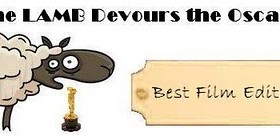Editor’s note: This is part of a 32-part series dissecting the 85th Academy Awards, brought to you by the Large Association of Movie Blogs and its assorted members. Every day leading up to the Oscars, a new post written by a different LAMB will be published, each covering a different category of the Oscars. To read the other posts regarding this event, please click here. Thank you, and enjoy!

By EFC of Exiled From Contentment
Without editing, all movies would be Andy Warhol movies. Hello everyone, here are my ramblings on the nominees for Best Film Editing:

Argo – I can give editor William Goldenberg many props regarding his ability to take 185 hours of raw footage and edit it all down to a tight 120 minutes of well-done storytelling. I can go on and on about the way he maintained an exciting pace throughout the entire feature, using the climactic sequence of Tony Mendez trying to get six U.S. diplomats out of the tolerant and progressive utopia that is Iran (So Far Away) as an example.
I can also write about how Goldenberg expertly cross-cuts between the 3 settings of Iran (where the diplomats are hiding out at some Canadian dude’s pad, eating up all his food, hogging the bathroom), CIA Headquarters in Langley, VA (where Ben Affleck and Breaking Bad are trying to figure out a proper rescue plan), and Hollywood, CA (with Walter Sobchak and homeboy from Freebie and the Bean just being their usual awesome selves) with the perfect amount of timing, cutting from one location to the next without making the audience feel like they’re spending too much time in any one place. But I won’t. Because I wouldn’t know what to write, aside from “Bravo, William Goldenberg.”

Life of Pi – Tim Squyres had to edit footage featuring a nonexistent animal actor (a tiger that would be added in later) and a location that wasn’t there (a vast, seemingly endless ocean), leaving him to fill in all that empty space with his imagination while timing his cuts, and only later after receiving his footage back with preliminary SFX added in was he able to re-cut and fine-tune the footage. What a pain in the ass; if you ask me, it’s all about real actors and locations FTMW.
Rather than cut in 2D, Squyres chose to edit Pi in its native 3D format, allowing him and director Ang Lee to assemble the footage while experiencing it in the same manner as their intended audience (people paying way too much just to watch a movie on a darkened screen while wearing uncomfortable plastic glasses). The final result is a work by Squyres that not only does this fantastic adaptation of Yann Martel’s book justice, but also takes advantage of what one can do with 3D footage (like 3D scene transitions that layer one scene on top of another), elevating the potentials of film editing to a whole new level, or should I say…a whole new dimension? SEE WHAT I DID THERE I KNOW COMEDY WHY AM I NOT HOSTING THE OSCARS

Lincoln (aka Hairy and Probably Unbathed White People in Dimly Lit Rooms Talking About Black People for Two-and-a-Half Hours) – When it comes to assembling raw footage into a bouillon cube of Cinematic Win, ace film editor Michael Kahn knows all too well that scenes consisting of nothing but pure dialogue are just as difficult — if not more difficult — to put together as action scenes or comic set-pieces. Get the timing wrong and you can either end up boring the audience or leaving them in the dust as they try their best to catch up with the conversation. With Lincoln, he does a great job cutting around all the blah blah & yada yada, knowing exactly how long to stay on a shot of someone while they’re pontificating and speechifying about why it’s cool/not cool to be down with the 13th Amendment, giving the audience just enough time to take in the full weight of what was said before cutting to the next craggily-faced bearded dude who probably doesn’t smell too nice.
Kahn also demonstrates Restraint as one of the most important tools for the editor, going with a Less Is More approach in this film; homeboy had plenty of camera setups to choose from, but when it came time to put together the many scenes of Daniel Day-Lewis doing his thing as the 16th President of the United States, both he and director Steven Spielberg felt it was best to forget the coverage and stick with the master shots in order to not distract from such a powerful performance. I don’t even want to imagine how this movie would’ve played, had it been edited by some young graduate from the Michael Bay School of Shot-Chopping; it might’ve been an hour shorter but I bet it would feel two hours longer.

Silver Linings Playbook – Wacky David O. Russell’s bipolar football dance flick was edited by old pro Jay Cassidy (who having worked as Sean Penn’s editor in the past, has had plenty of experience in dealing with Crazy) and youngblood Crispin Struthers. Together they were able to use editing as a way to put the audience into a similar mindset as Bradley Cooper’s character; when he gets more frantic or agitated, the cuts become intense and jarring, sometimes quickly cutting away from a camera movement before it’s even fully registered to the viewer. Or maybe that was just me projecting my own mental illness during my viewing experience of this film, I don’t know.
Because Russell kept the cameras rolling for most of the shooting day, the editors were left with much more footage than was expected, featuring unplanned moments that were never in the original script — new lines that were written on the set, ad-libs, spontaneous actions, and alternate takes of scripted scenes (with variations of tone). They had to find what worked best within all that exposed footage while continuing to maintain a proper story/character balance throughout the film’s running time, which I’m sure was tricky for a movie with as many sudden tonal shifts as this one. But they pulled it off beautifully and definitely earned the recognition for their work here. Plus, I’m sure they had plenty of David O. Russell on-set temper tantrum footage which couldn’t have been easy to keep on the down-low.

Zero Dark Thirty – Hot old chick director Kathryn Bigelow’s drama about the hunt for the Notorious O.B.L. was edited by Dylan Tichenor and…William Goldenberg? Oh snap, Goldie — you worked on this one too? Damn son, if you’re not careful, you’re gonna end up canceling yourself out by splitting up your Oscar votes. And while you might be OK with being the 2013 winner of the 2007 Roger Deakins Award for Being Your Own Worst Competitor On Account Of Being Too Damn Awesome, I don’t think your co-cutter Tichenor is gonna be cool with that. But I’m sure he’ll still appreciate how you stepped in to edit the majority of the film’s climax, where Seal Team Six raids Osama bin Laden’s crib and — SPOILER — double-taps that son-of-a-bitch straight to Virgin Ladyland (pop. 70).
It’s good stuff, Goldenberg, the way you took all that raid footage (most of it shot with 4-5 cameras simultaneously) and put together an exciting real-time sequence that kept us on the edge of our seats, even though we already knew how the story would end. But you gotta give Tichenor lots of credit too for editing a good chunk of the film as well, going through all that coverage (320 hours worth) and whittling it down to an engrossing 157 minutes of Jessica Chastain looking all intense in her sunglasses while rocking those spiffy black & grey outfits. Oh, and I wanna give the both of you props for lingering on those shots of James Gandolfini long enough for us to concentrate on what his character was saying, because if you guys had cut to early, all we would’ve gotten out of it was how morbidly obese he’s gotten. Good looking out, guys. Much appreciated.

Who will win? I think Zero Dark Thirty is most deserving of the Most Awesome Household Saint Ever, but Argo will probably take it because the Best Picture winner (which will most likely be Argo) usually wins Best Film Editing as well. Even if Argo doesn’t win Best Picture, it’ll still win in the editing category just for the scene where Hollywood make-up expert John Chambers (played by John Goodman) discusses the fake movie caper with CIA agent Tony Mendez. The plan involves passing off the diplomats as filmmakers, so Mendez asks him if it’s possible to teach one of them how to be a director in one day, and Chambers responds with “You can teach a rhesus monkey to be a director in a day”. Goldenberg then immediately cuts to a reaction shot of Mendez — played by rhesus monkey-turned-director Ben Affleck. Kuleshov ain’t got nothing on my man, the Goldster.
In conclusion, I don’t know how to end this. Bon appetit!





